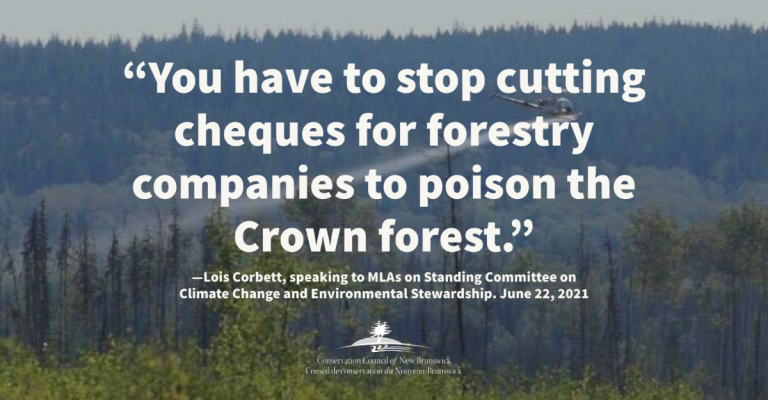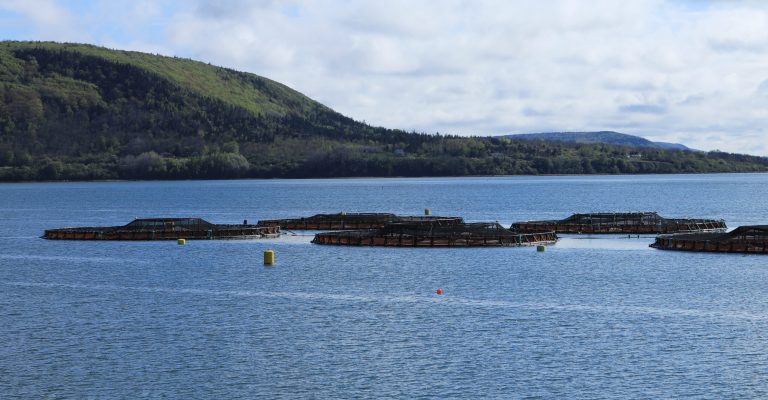
In this edition of EcoNews, we bring you the staggering but not surprising numbers showing just how badly the province’s biggest forestry companies are ignoring citizens and scientists’ calls for less clear cutting and glyphosate spraying; our Fundy Baykeeper raises the flag on a multi-billion-dollar salmon aquaculture company’s plan to expand its fish farms in the already stressed Outer Bay of Fundy; we share the encouraging story of P.E.I.’s shift to electric school buses and call on New Brunswick to follow suit; and we invite you to an exciting upcoming webinar where Stanford’s Mark Jacobson will present his clean electricity roadmap for Canada and answer the oft-repeated question, “what if the wind doesn’t blow?”

Glyphosate Spraying Up 30% On Crown Forest Since 2005
As you read this, helicopters are spraying vast swaths of Crown forest with glyphosate-based herbicides to kill hardwoods and other vegetation that competes with the softwood monocultures planted on forestry companies’ large-scale clearcuts. And data from the National Forestry Database and GeoNB shows that the amount of Crown land sprayed is getting more and more vast over time—up a staggering 30 per cent since 2005. Unsurprising, as the biggest company operating on Crown land, J.D. Irving is leading the spray pack. Our Executive Director, Lois Corbett, has more on the data and what is driving the rampant clear cutting and spraying in New Brunswick despite multiple reports and calls—from the Conservation Council, our supporters, allied groups, scientists, to the Auditor General’s office—for big changes to the way we manage our forest.

Fundy Baykeeper Flags Significant Concerns As Cooke Aquaculture Aims To Expand Salmon Farming In Outer Bay
Matt Abbott, Fundy Baykeeper and Director of Marine Conservation, breaks down why the province should reject a proposal from the multi-billion-dollar Cooke Aquaculture to add a new salmon farming site in the already stressed and sensitive waters of the Outer Bay of Fundy. The Baykeeper says sea lice, disease, and legal and illegal pesticide use are just some of the concerns with adding a new site to a region that already houses some of the densest siting of salmon farms in the world.

Electric School Buses: Better For Our Kids' Health, Better For Our Climate
As New Brunswick students return to school this week, they may be a little envious of their peers in Prince Edward Island. One quarter of that province’s school bus fleet is already electric, with the P.E.I. government aiming for a fully-electric fleet over the next decade. By comparison, New Brunswick only has two electric buses on the road. Dr. Louise Comeau, Director of Climate Change and Energy Solutions, lays out why New Brunswick should follow P.E.I.’s example, and how converting our exhaust-spewing diesel buses to electric will both improve student health and help meet our climate goals.

New School Year, New Exciting Opportunities For Kids To Learn Outside In Nature
Our Learning Outside Coordinator and in-house ecologist, Dr. Nadine Ives, is excited to help province’s hard-working teachers get their students out of the classroom and back where kids learn best – outside, in the fresh air, where hungry minds can take in the sights and sounds of nature! For more than a decade, the Conservation Council’s Learning Outside project has developed and delivered fun, engaging curriculum-based activities and educational materials all about New Brunswick species and habitats to support and encourage teachers to take their classes outside. Learn more about this awesome initiative, and find out how you can book a visit from Dr. Ives to your child’s classroom this school year.
Events

Sept. 28 | 8 p.m. — It’s a familiar refrain: “We can’t transition to 100 per cent renewable energy, because what if the sun doesn’t shine or the wind doesn’t blow?” While politicians and power corp. executives can’t seem to wrap their heads around it—and put plenty of roadblocks in the way—a transition to 100 percent clean renewable energy is economically and technologically feasible today. The Conservation Council is excited to co-host the Sierra Club Canada-Atlantic Chapter’s upcoming webinar, What If The Wind Doesn’t Blow, with renown Stanford professor Mark Jacobson discussing his energy research and clean energy transition roadmap for Canada. Register here!
Sept. 16 | 8 p.m. — Don’t miss the season premiere of CBC’s documentary programme, The Passionate Eye, for the airing of award-winning Canadian filmmaker Jennifer Baichwal’s Into The Weeds: Dwayne “Lee” Johnson VS. Monsanto Company. The documentary tells the powerful story of Johnson, a former groundskeeper who took on the multinational agrochemical giant after a terminal cancer diagnosis. Learn more about the film and watch the trailer here.

We work hard to ensure a strong environmental voice is heard in the New Brunswick print, radio and television media. Click the link below for the latest stories Conservation Council staff have been called upon for expertise, analysis and commentary:
This edition’s media roundup includes interviews with our team on the proposed green hydrogen plant in northern New Brunswick and provincial carbon pricing plans. Read all about it here.
